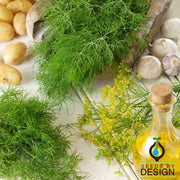Growing Non-GMO Mammoth Long Island Dill Herb Seeds
How to Grow Mammoth Long Island Dill from Seed
Dill does not transplant well and is best if sown directly in early spring. For potted growing, begin indoors 4-6 weeks before final frost. Plant 3-4 seeds ¼" deep per cell or 10-12" apart in the garden in sandy, loamy, and well-drained soil in full sun. Seeds germinate in 10-21 days, thinning back to 1 plant per pot or 15" apart in the garden as true leaves establish. Do not grow near carrots to avoid hybridization.
Non-GMO (Anethum graveolens) Mammoth Long Dill plants grow as tall and aromatic warm-season annuals. However, Mammoth Long Dill varieties easily reseed and can grow back the following season as biennials. As large-sized pungent dill varieties, your Mammoth Long Dill will develop upright and for a longer growing season in either late spring or fall. With the warm temperature, the herbs" pungent lacey foliage will turn vibrant green and reach 4-6" high.
Mammoth Long Island Dill in the Herb Garden
As this biennial dill can grow anywhere from 4-6" tall, this large-sized plant can provide shade to other herbs or vegetables, while also making an attractive decorative herb to the borders of your garden. You can harvest the pungent lacey-green dill leaves anytime for eating or simply watch all the beneficial pollinators visit your gardens such as butterflies and honeybees.
Mammoth Long Dill develop as large-sized warm-season biennials often grown as annuals. This type of dill is noted as a Tennessee native cultivated by Native Americans of the Cherokee tribes. Similar to its Bouquet Dill relative, Mammoth Long produces larger bright-yellow flower umbels and more seeds per head. This 4-6" tall herb can either enhance garden borders as a decorative plant or as a pickled seasoning due to Mammoth Long Dill's pungent flavor!
Mammoth Long Dill can also enhance the flavor, nutrition, and development of tomatoes, onions, and carrots as a companion plant.
Harvesting Mammoth Long Island Dill
Leaves - You can begin harvesting 60 days from the sowing date or as soon as the plant has produced several leaves. Keep plants pruned to delay flowering. If your plant goes to seed, there is a strong chance that the leaves will diminish in flavor.
Seeds - Growing dill for seeds requires less maintenance because the goal is to allow it to flower and go to seed. So, it is a waiting game. Watch your umbel flower bloom and then allow the dill seed pods to form and turn brown. Once they do, clip the dried umbels and place them in a paper sack. Shake and gather the seeds from there. Seeds are strong in dill flavor, used famously in the pickling process of cucumbers.
About Mammoth Long Island Dill Herb Seeds
Mammoth Long Dill Herbs make an aromatic seasoning and spice for many dishes. This large-sized and strong-flavored dill is noted as the ideal variety for pickling, using fresh or drying the leaves to store. With its fresh, tangy, and dill-like flavor, Mammoth Long provides pungent and vibrant-green leaves you can either cook with or sprinkle on top of omelets. This herb is most often used as the perfect dill to add to pickles, warm soup, or fresh salads.
This aromatic herb will produce baby greens that can be picked earlier. Once Mammoth Long Dill Herbs reach maturity, umbels of bright-yellow flowers will emerge by summer or late fall, before drying and setting seed.
Mammoth Dill, Plants grow between 4 to 6 feet depending on soil fertility. Dill plants like a nice loamy, sandy soil with good drainage. Dill seed heads can grow to 18 inches across giving over a cup of dill seed per head! Use the lush green foliage fresh or dried.
We put away plenty of dill seed for pickling and for adding flavor to just about anything. Also, you can dry dill leaves and use them in cooking later on. Dill tea is considered good for an upset stomach, and an ingredient in "gripe" water because of its ability to ease flatulence and colic.






